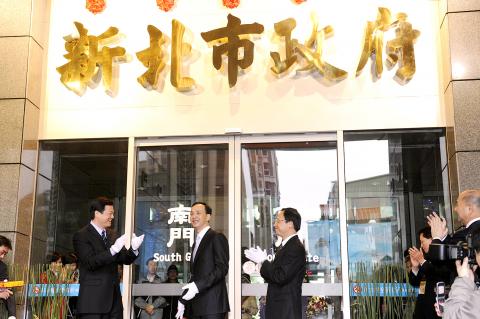Eric Chu (朱立倫) yesterday assumed the mayorship of New Taipei City (新北市, the proposed English name of the upgraded Taipei County) and proclaimed the end of Taipei County and the arrival of “the beginning of a new age.”
“Today marks the beginning of the new age in which New Taipei City will compete with the four other special municipalities in the country,” he said during the swearing-in ceremony.
“There will not be any holidays during my four-year term. Every day will be a workday as we strive for the development of New Taipei City,” he added.

PHOTO: GEORGE TSORNG, TAIPEI TIMES
Minister of the Interior Jiang Yi-huah (江宜樺) presided over the swearing-in ceremony and handed Chu the official seal.
Expounding on his administrative principles, Chu said the relationships between the city government and its residents, and the city government and the central government, will be relationships of partnership “in which [the city] will push for all kinds of development to create a win-win situation.”
Chu’s campaign platform included an aggressive plan to extend the MRT system, creating 10 new lines, including three circular networks. He has also promised New Taipei City residents that by 2020, construction would either have started or be completed on 80 new stations and 100km of new tracks.
During Chu’s inaugural ceremony, Amis Aborigines from the Sanying Aboriginal Community along Dahan River (大漢溪) were blocked by police as they attempted to petition the mayor.
Buses carrying the Aborigines were stopped blocks away from city hall, and they were not allowed to go near the event until after the mayor left.
Chu’s election as mayor has worried many Aboriginal communities along rivers in New Taipei City because he has a record of demolishing riverside Aboriginal communities since his tenure as Taoyuan County commissioner.
Meanwhile, the new special municipality has still not figured out what to call itself in English.
On Monday Chu announced that the city shall henceforth be known in English as “New Taipei City” because Sinbei means “new Taipei” in Chinese.
However, the move has been blocked by the Ministry of the Interior for the time being, as Deputy Minister of the Interior Chien Tai-lang (簡太郎) said the ministry would discuss the proposal with Chu at a later date.
Additional reporting by Loa Iok-sin

CHANGING LANDSCAPE: Many of the part-time programs for educators were no longer needed, as many teachers obtain a graduate degree before joining the workforce, experts said Taiwanese universities this year canceled 86 programs, Ministry of Education data showed, with educators attributing the closures to the nation’s low birthrate as well as shifting trends. Fifty-three of the shuttered programs were part-time postgraduate degree programs, about 62 percent of the total, the most in the past five years, the data showed. National Taiwan Normal University (NTNU) discontinued the most part-time master’s programs, at 16: chemistry, life science, earth science, physics, fine arts, music, special education, health promotion and health education, educational psychology and counseling, education, design, Chinese as a second language, library and information sciences, mechatronics engineering, history, physical education

DEADLOCK: As the commission is unable to forum a quorum to review license renewal applications, the channel operators are not at fault and can air past their license date The National Communications Commission (NCC) yesterday said that the Public Television Service (PTS) and 36 other television and radio broadcasters could continue airing, despite the commission’s inability to meet a quorum to review their license renewal applications. The licenses of PTS and the other channels are set to expire between this month and June. The National Communications Commission Organization Act (國家通訊傳播委員會組織法) stipulates that the commission must meet the mandated quorum of four to hold a valid meeting. The seven-member commission currently has only three commissioners. “We have informed the channel operators of the progress we have made in reviewing their license renewal applications, and

The High Prosecutors’ Office yesterday withdrew an appeal against the acquittal of a former bank manager 22 years after his death, marking Taiwan’s first instance of prosecutors rendering posthumous justice to a wrongfully convicted defendant. Chu Ching-en (諸慶恩) — formerly a manager at the Taipei branch of BNP Paribas — was in 1999 accused by Weng Mao-chung (翁茂鍾), then-president of Chia Her Industrial Co, of forging a request for a fixed deposit of US$10 million by I-Hwa Industrial Co, a subsidiary of Chia Her, which was used as collateral. Chu was ruled not guilty in the first trial, but was found guilty

Taiwan People’s Party (TPP) Chairman Huang Kuo-chang (黃國昌) yesterday appealed to the authorities to release former Taipei mayor Ko Wen-je (柯文哲) from pretrial detention amid conflicting reports about his health. The TPP at a news conference on Thursday said that Ko should be released to a hospital for treatment, adding that he has blood in his urine and had spells of pain and nausea followed by vomiting over the past three months. Hsieh Yen-yau (謝炎堯), a retired professor of internal medicine and Ko’s former teacher, said that Ko’s symptoms aligned with gallstones, kidney inflammation and potentially dangerous heart conditions. Ko, charged with